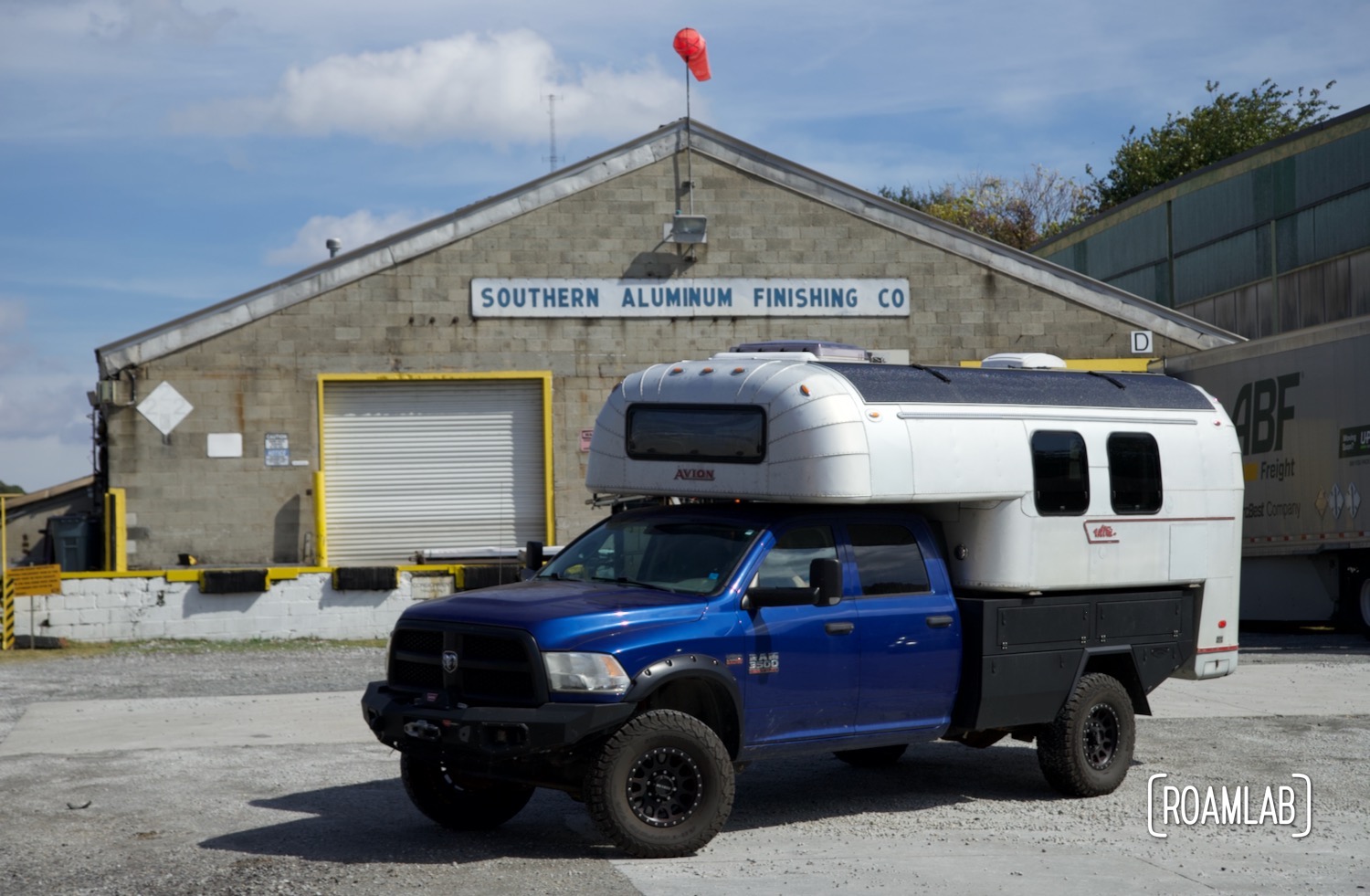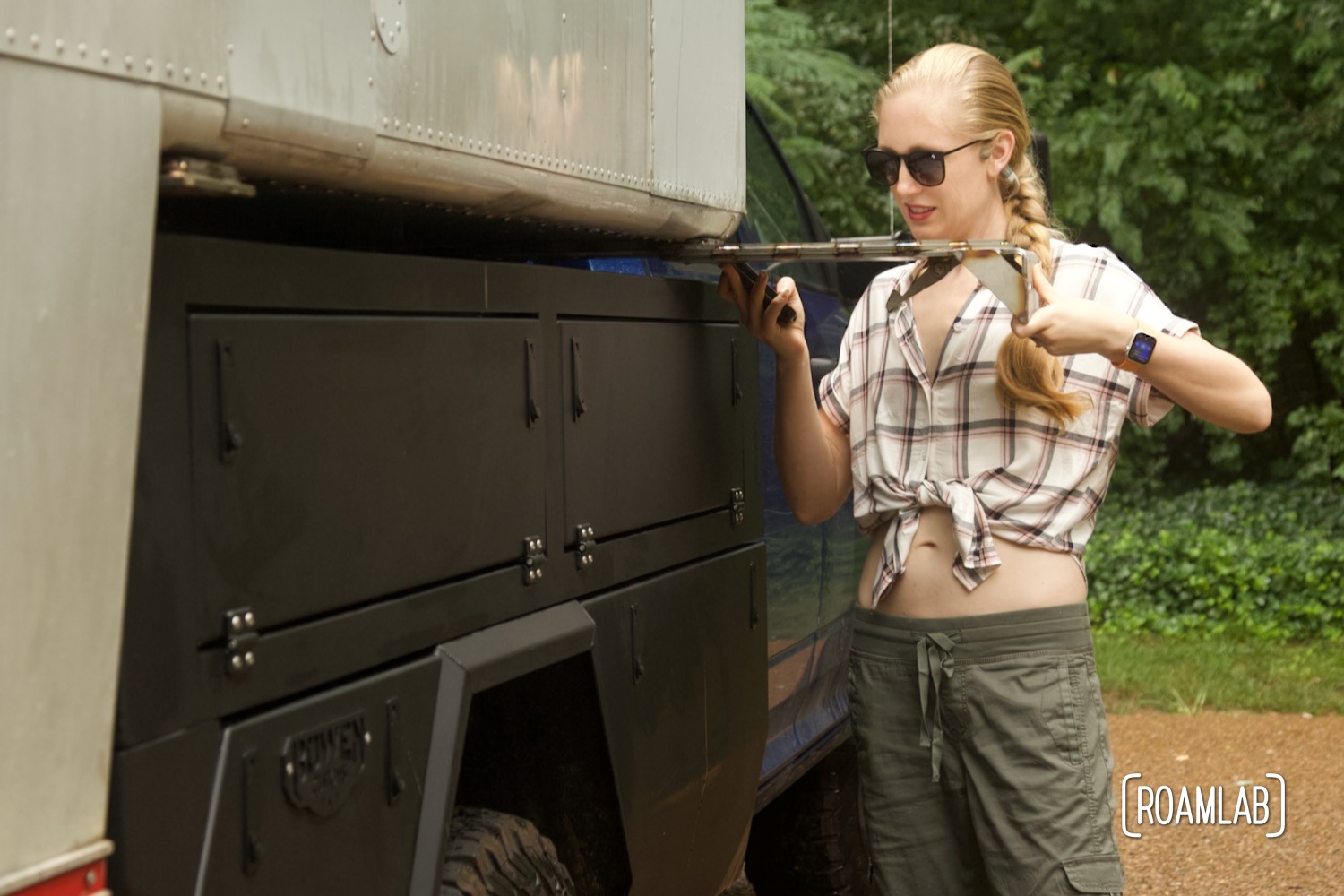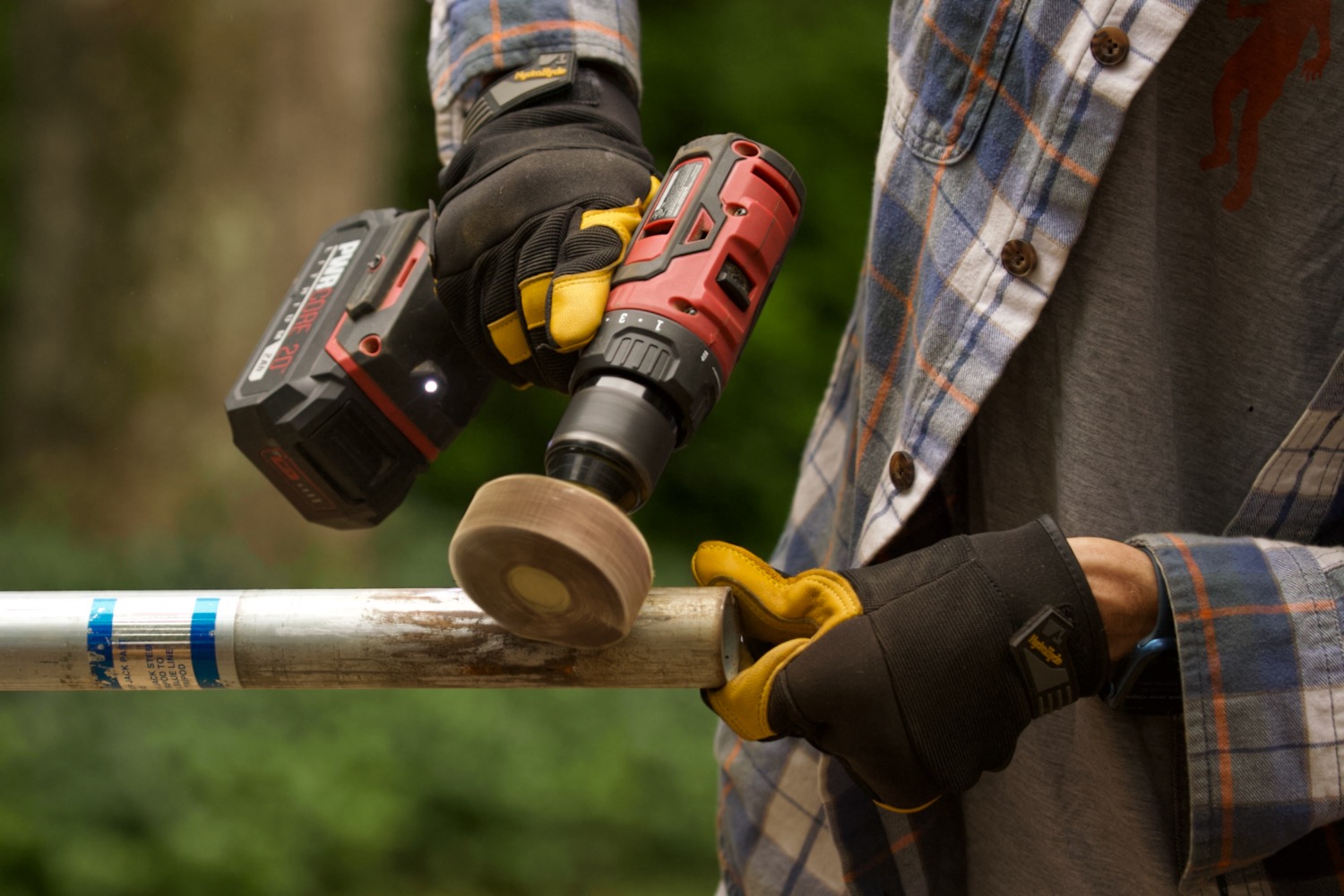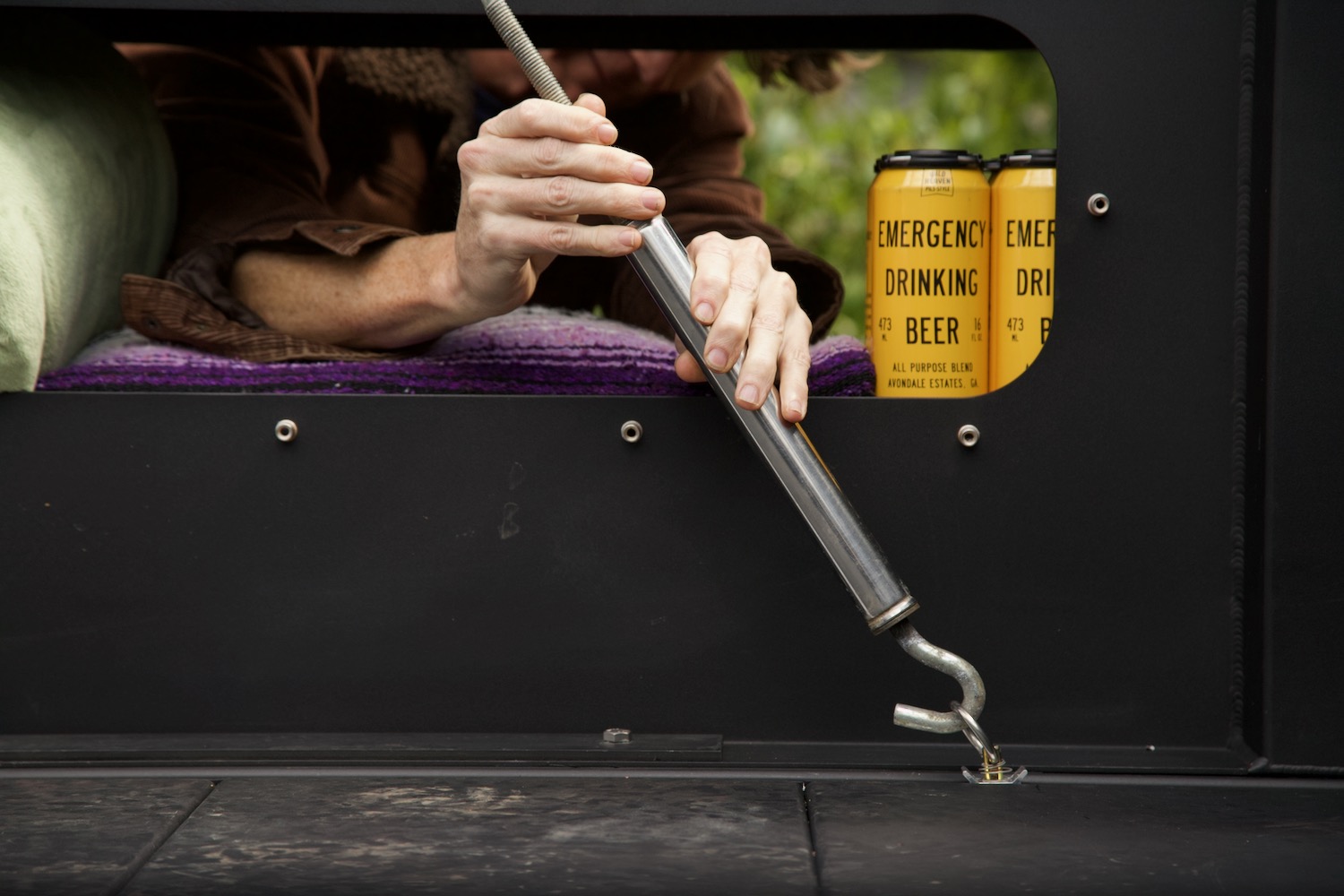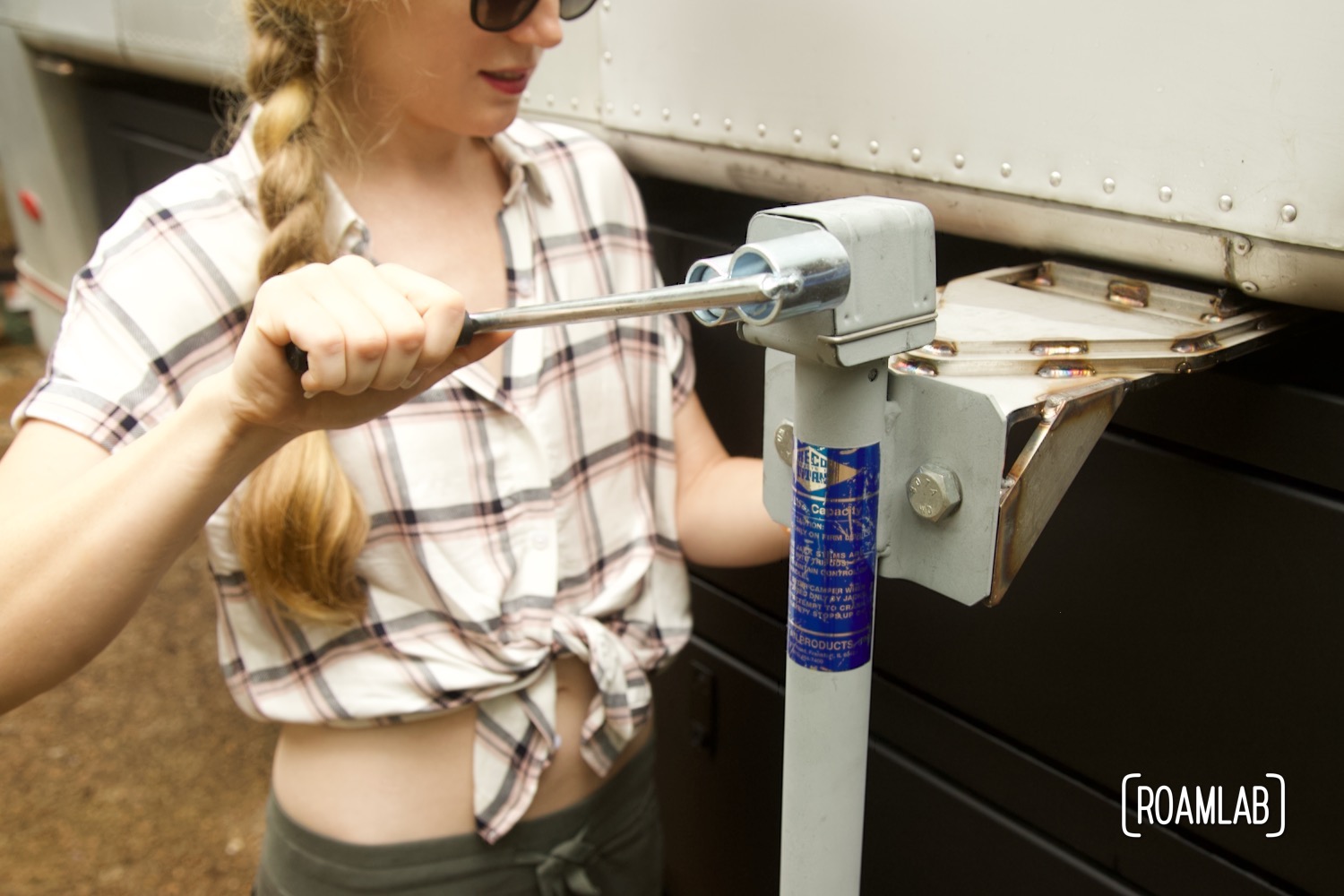
Truck Camper Jacks Features Guide
Our Avion C11 floats in the air on silver stilts when the gear pin gives way. “It won’t turn.” I attempt to wiggle the handle hoping to free the gears from some unseen impediment. No luck. And, with that, we need a new set of truck camper jacks.
There are worse things that can happen when loading a truck camper into a truck bed. Catastrophic things. But having the jacks break mid-load certainly causes trouble. In this case, we manage to fashion a short-term replacement pin and finish loading our truck camper into the truck bed. But the failure is confirmation of something we already suspected: after nearly 50 years, it is time to get a new set of jacks for our truck camper. But before we make our order, there are a lot of decisions to make.


About Truck Camper Jacks
Truck camper jacks are devices that raise and support the camper. Jacks are mainly used for loading and unloading the camper from the truck bed, though they can be used to support the camper while off the bed, depending on the jack’s specifications.
The jacks generally come in sets of four and attach to the camper wings–the lowest accessible section of the truck camper that sits over the truck bed walls. From this leverage point, the jacks can distribute the camper’s weight between each corner of the camper. Most truck camper jacks raise and lower the camper with an internal screw mechanism that extends the main shaft for the jack to lift the camper or contract to lower it.
Most truck campers come with a set of jacks, but there is a thriving aftermarket for truck jacks to make the process of loading and unloading a camper faster, easier, and more secure. To select the right set of jacks for us, however, we have several options to consider. And we don’t want to rush the process because jacks are heavy and expensive. We don’t want to spend more money or carry more weight than we absolutely have to.



How Many Camper Jacks?
This question may seem academic. Almost all truck campers on the market using four jacks, one on each corner of the body. But not all. When we picked up our 1970 Avion C11 truck camper, it still had its original configuration of three jack points. Two on the corners of the driver’s side and one in the middle of the passenger side.
When we replaced the original set, however, we shifted the mounting points to add a fourth jack for a more even lift.

Mechanical vs. Electric Jacks
When addressing truck camper jacks, the first big question to tackle is mechanical or electric. Mechanical jacks tend to be the default option. With these, we use a hand crank to raise and lower each jack, individually. It’s a tried a true method, but it’s awkward and time-consuming.
Electric jacks offer an enticing alternative that is easier, faster, and can be more stable. With electric jacks, all four jacks can be deployed in concert and can be self-stabilizing. This is incredibly enticing, considering that truck campers can be warped or even destabilized by unevenly deployed jacks. That said, electric jacks are more expensive, and since most are wired into the truck camper, they are permanently mounted, which can be inconvenient in particular situations. (More on that in our permanent vs removable section)
Overall, the choice between mechanical and electric is one of price and convenience. For those that frequently mount and unmount their campers, the electric jacks can be a no-brainer. But for those that are more frugal and don’t rely on jacks as often, the mechanical option is more than sufficient.
| Pros | Cons | |
|---|---|---|
| Mechanical Jacks | Less expensive Removable | Slow the attach and use Possible to warp when unevenly used |
| Electric Jacks | Quick and easy Self-stabilizing | More expensive Can’t be removed when in the way |

Permanent vs. Removable Jacks
Jacks can also be permanent or removable. As alluded to earlier, electric jacks tend to be permanently mounted because they are wired into the camper. But, with mechanical jacks, you often can choose between jacks that are permanently mounted to the sides of the truck camper or removable jacks.
Permanently mounted jacks are convenient, as they don’t require the additional time spent attaching them to the truck camper. But they can also be eyesores and catch on the brush while navigating more narrow trails. This is why these are not a common choice for overland rigs, and other truck campers meant for remote camping.
Removeable jacks, on the other hand still require some form of permanent mounting to attach to. This tends to be a bracket on the truck camper wings that the jacks are bolted to. It can be a time-consuming process, but it means that the jacks can be stowed out of the way when they are not in use. Granted, that stowing away comes with its own downsides when storage space can be at a premium.
Once again, we find this to be a profoundly personal choice that is best tailored to each individual’s use of their truck camper.
| Pros | Cons | |
|---|---|---|
| Permanently Mounted Jacks | Quick and easy to use | In the way when on a narrow trail |
| Removable Jacks | Out of the way while not in use | Takes up storage space |

Standard vs. Heavy Duty Jacks
The question of standard vs. heavy duty jacks is one of the few choices where there is little ambiguity. Heavy duty jacks are predictably heavy, and there is little point in traveling with them unless you absolutely need them. That said, if you have a heavy truck camper, then you absolutely need heavy-duty jacks to lift it.
So, we need to know the wet weight of our truck camper to know which kind of truck jacks we need.
| Pros | Cons | |
|---|---|---|
| Standard Jacks | Lightweight (relatively) | Can only lift light campers |
| Heavy Duty Jacks | Support extra heavy campers | Heavy and bulky |

Tripod vs. Footpad
The base of each jack tends to end in either a tripod or a footpad. This doesn’t tend to be a selling point. It’s more a result of other characteristics of a jack, but it’s worth addressing. Tripod bases used to be the industry standard, offering more stability. But footpads take up less space and require fewer moving parts, so manufacturers have been trending towards single footpads in applications where tripods are not absolutely necessary.
Generally, permanently mounted jacks have a footpad. Standard removable jacks may or may not have a tripod. But heavy-duty jacks absolutely will have a tripod for that extra support.
| Pros | Cons | |
|---|---|---|
| Tripods | More stable | Bulky |
| Footpads | Low profile | Less stable |

Major Truck Camper Jack Manufacturers
Jacks come in all sorts of shapes and sizes and for a wide range of purposes. But when shopping for truck camper jacks, it’s important to buy purpose-built truck camper jacks. We don’t want to risk harming our truck camper by attempting to use a jack that isn’t designed for this purpose. Fortunately, there are several established players in this market. Rieco Titan, Brophy, Happijac, and Lippert all specialize in truck camper jacks. Though each has its own unique takes on design and features.
Buying Truck Camper Jacks
Truck camper jacks are a sufficiently niche product that there are few brick and mortar stores that carry them. Some RV stories will have a relationship with certain manufacturers to special order jacks. Otherwise, like so many other things, you can buy jacks online. Sites like eTrailer and Amazon carry a variety of jacks but shipping these large and heavy products often comes with more restrictive shipping and return policies. So, be sure to confirm that you have ordered exactly what you want before completing a purchase. Many listings can be hard to compare because jacks can be sold individually and in sets of two or four.
Scam Warning
With their high upfront cost and narrow market and particularly during recent shortages, scammers have found jacks sales to be a profitable scam. We encountered several websites that listed jacks for sale, but once the purchase is complete, they will notify the buyer that the jacks are temporarily out of stock. The site will ask for patience while new stock is ordered. Granted, there are plenty of legitimate businesses that have inventory go out of stock. But responsible retailers tend to alert buyers before they complete a sale and give the option of waiting for the product to come back in stock.
The best indicator of whether this is a good faith interaction is how difficult it is to get a refund. Scammers will often start apologetic but get combative or nonresponsive if we try to get our money back. Fortunately, most credit card companies have a process to challenge a charge.
The main takeaway is to be cautious when buying from an unknown third party. Quite often bad actors will already have a reputation on other websites that share horror stories of bad business experiences. And be sure to pay through a service that will allow you to challenge the charges if your purchase is not completed within a reasonable period of time.
Our Truck Camper Jacks
Like so many things, choosing a set of jacks can be a deeply personal and contextual decision. Even so, as a case study, I’ll share how we chose our truck jacks.
As we stated at the beginning, we need new jacks because our old jacks are failing. We aren’t upgrading out of some desire for convenience or speed. Instead, our priorities are stability, trail readiness, and a pinch of vanity. With all our work put into the camper, we want sturdy jacks that won’t catch on the brush while we are off the pavement and that we can stow away, so they don’t distract from the streamlined style of our Avion truck camper.
This becomes doubly the case once we added our Bowen Customs truck bed with storage boxes. Permanently mounted jacks would block the boxes from opening. So, while electric jacks would be more convenient when in use, we opt for mechanical, removable jacks on tripods. Specifically, we have a set of Rieco-Titan Standard Duty Tripod Jack.

Upgrading Our Jacks
There is a caveat to this because we have attempted to upgrade our front jacks to heavy-duty mechanical jacks. Unfortunately, inventory shortages mean that we can not buy from known vendors. Instead, we take a risk on a couple of third-party vendors. Yes, my earlier note on scams comes from experience because what distinguishes these vendors from others isn’t that they have jacks that the others do not but that they are willing to lie about their inventory.
The first vendor never makes good on delivery and fights tooth and nail when we challenge their charge through our credit card company. It takes over a month, but we do get our money back.
The other vendor is similarly slow to act but eventually sends us a package… with one of the two jacks advertised. Their con is a little more sophisticated in that returning the single jack for a full refund is laborious to a point of impracticality. So, 5/10, would not buy from it again.
At some point, we will try to get a final heavy-duty jack. But at this moment, we don’t want to waste our time with other dodgy dealers. We’ll wait for them to come back in stock with a reputable seller.
Truck Camper Jack Maintenance
After spending a fair bit of money on new jacks for our truck camper, it is important to ensure that we take care of them so that they last as long as possible. Truck camper jacks are made out of steel for strength. After all, they support a lot of weight when lifting the truck camper. But stainless steel would be impractically expensive. Instead, most jacks are powder coated or come with a sacrificial zinc coat to protect the jacks from corrosion. But paint chips and zinc wears away. And when the base steel is exposed, it can corrode, weakening the steel.
To prevent corrosion, we can minimize wear by storing the jacks in a protected, dry environment while not in use. That said, our jacks are often in use when we are working on our camper. So they are often exposed to the elements, which wears away the zinc coating. This year, we took the time to clean off any corrosion on the jacks and recoat them. You can learn more about the process in our post Corrosion in Campers.

Final Thoughts on Truck Camper Jacks
Overall, jacks are a critical purchase for any truck camper owner, and getting the right set can mean the difference between a camper sitting snug in your truck bed or tipped over on its side. Do your research, ask around, and be patient in your search for the perfect jacks. And remember, even if you don’t get it right the first time, there is the opportunity to upgrade later on. So, don’t sweat it too much and just enjoy hitting the open road in your truck camper.





